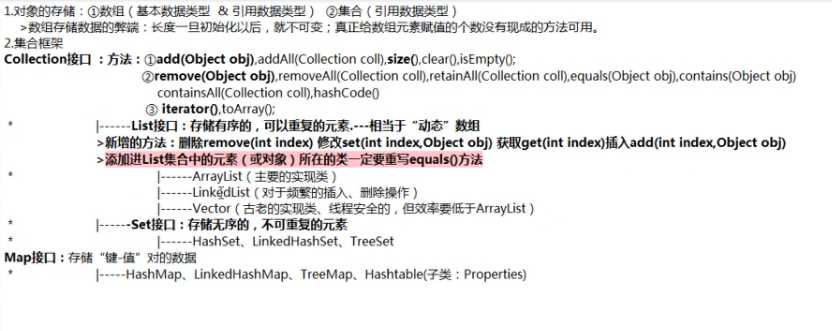Java-集合的总结
Posted
tags:
篇首语:本文由小常识网(cha138.com)小编为大家整理,主要介绍了Java-集合的总结相关的知识,希望对你有一定的参考价值。

Collection:接口
只有通过Collection接口中toString()进行重写,才能够System.out.print(coll)显示Collection集合中元素
|-----Set:元素无序,不可重复的集合
|---hashSet(主要实现类) +LinkedHashSet(添加顺序遍历集合中元素)+TreeSet
Set 使用的方法基本上Collection接口下定义;
无序:元素底层存储的位置无序的,不重复性:添加相同元素无法添加进去
HashSet(自定义类的重复性重写 hashCode和equals方法):原理:向Set集合中添加元素,首先hashCode方法计算hash值,决定此对象存取的位置
在此位置有对象,在比较equals方法----注意:重写HashCode方法:对象属性值一样保证HashCode一样,对象属性值不一样保证HashCode不一样,不要相同hashcode值但是有不同的属性值。
Treeset:(对加入元素进行排序处理)存储对象按照ComparaTo方法进行排序
1.TreeSet添加元素属于同一个类型,HashSet属于不同类型
2.两种排序: 1.自然排序 自定义类实现的是 Comparable 接口 重写ComparaTo(按照某种属性排序,属性相同按照其他属性相同) +hashCode+equals方法
2.定制排序:1.创建一个Comparator接口的对象(采用匿名内部类方法) 2.在此对象中重写Compare的方法在此compare方法指明按照某个属性进行排序,3.将对象作为形参 传入TreeSet构造器中。
要求重写 comparaTo 和Compare方法 与equals和HashCode方法表持一致---hashCode和equals用于对元素的储存
|--------List:元素有序,可重复:相当于动态的数组
|----ArrayList(主要的实现类) + LinkedList(适用于频繁的插入和删除)
对于Collection的contains()方法判断依据 元素所在类的equals方法,如果元素使用自定义类的 重写自定义类中equals方法
Map 接口:具有映射关系 存放的键-值对
Key 使用set存储,不能重复;value用Collection存放,key-value 对构成entry,entry(Map.entrySet)使用Set存放
|---HashMap:线程不安全存放null 值
|---HashTable;线程安全的
|---Properties处理属性文件 ConcurrentHashMap:CAS的积极锁的操作
|----TreeMap:按照可以所在类指定属性排序 Key必须要是同一个类型
Collections是集合的工作类,大部分static 的方法
1 package com.testCollection; 2 3 public class Empolyee implements Comparable{ 4 5 private String name ; 6 private Integer age; 7 private MyData birthday; 8 public String getName() { 9 return name; 10 } 11 public void setName(String name) { 12 this.name = name; 13 } 14 public Integer getAge() { 15 return age; 16 } 17 public void setAge(Integer age) { 18 this.age = age; 19 } 20 public MyData getBirthday() { 21 return birthday; 22 } 23 public void setBirthday(MyData birthday) { 24 this.birthday = birthday; 25 } 26 // 遍历的时候直接打印输出 27 @Override 28 public String toString() { 29 return "Empolyee [name=" + name + ", age=" + age + ", birthday=" + birthday + "]"; 30 } 31 public Empolyee(String name, Integer age, MyData birthday) { 32 super(); 33 this.name = name; 34 this.age = age; 35 this.birthday = birthday; 36 } 37 @Override 38 public int hashCode() { 39 final int prime = 31; 40 int result = 1; 41 result = prime * result + ((age == null) ? 0 : age.hashCode()); 42 result = prime * result + ((birthday == null) ? 0 : birthday.hashCode()); 43 result = prime * result + ((name == null) ? 0 : name.hashCode()); 44 return result; 45 } 46 @Override 47 public boolean equals(Object obj) { 48 if (this == obj) 49 return true; 50 if (obj == null) 51 return false; 52 if (getClass() != obj.getClass()) 53 return false; 54 Empolyee other = (Empolyee) obj; 55 if (age == null) { 56 if (other.age != null) 57 return false; 58 } else if (!age.equals(other.age)) 59 return false; 60 if (birthday == null) { 61 if (other.birthday != null) 62 return false; 63 } else if (!birthday.equals(other.birthday)) 64 return false; 65 if (name == null) { 66 if (other.name != null) 67 return false; 68 } else if (!name.equals(other.name)) 69 return false; 70 return true; 71 } 72 @Override 73 public int compareTo(Object o) { 74 if(o instanceof Empolyee) 75 { 76 Empolyee e1=(Empolyee) o; 77 // 本对象Name与输入名字进行标胶 78 int i=this.name.compareTo(e1.getName()); 79 if(i==0) 80 return this.age.compareTo(e1.getAge()); 81 else 82 return i; 83 } 84 return 0; 85 } 86 87 }
1 @Test 2 public void test2() 3 { 4 // 创建一个实现Comparator类 的对象 自定义类防止混淆,创建新的类,有相同的属性 5 Comparator com=new Comparator(){ 6 7 @Override 8 public int compare(Object o1, Object o2) { 9 if(o1 instanceof Employee1 && o2 instanceof Employee1) 10 { 11 Employee1 e1=(Employee1) o1; 12 Employee1 e2=(Employee1) o2; 13 14 // 按照年月日比较 15 MyData birth1=e1.getBirthday(); 16 MyData birth2=e2.getBirthday(); 17 18 boolean birthequals=false; 19 if(birth1.getYear()!=birth2.getYear()) 20 { return birth1.getYear()-(birth2.getYear());} 21 else 22 { 23 if(birth1.getMonth()!=birth2.getMonth()) 24 return birth1.getMonth().compareTo(birth2.getMonth()); 25 else 26 { 27 if(birth1.getDay()!=birth2.getDay()) 28 {return birth1.getDay().compareTo(birth2.getDay());} 29 else 30 birthequals=true; 31 } 32 } 33 // 按照名字进行排序 34 35 } 36 return 0; 37 } 38 }; 39 // 自定义时候传入Comparator类的对象 40 TreeSet set=new TreeSet(com); 41 Employee1 e11=new Employee1("刘德华",55,new MyData(4,12,1966)); 42 Employee1 e2=new Employee1("刘德",55,new MyData(4,12,1956)); 43 44 set.add(e11); 45 set.add(e2); 46 47 for(Object str:set) 48 System.out.println(str); 49 50 }
以上是关于Java-集合的总结的主要内容,如果未能解决你的问题,请参考以下文章
201621123037 《Java程序设计》第9周学习总结
201621123057 《Java程序设计》第9周学习总结